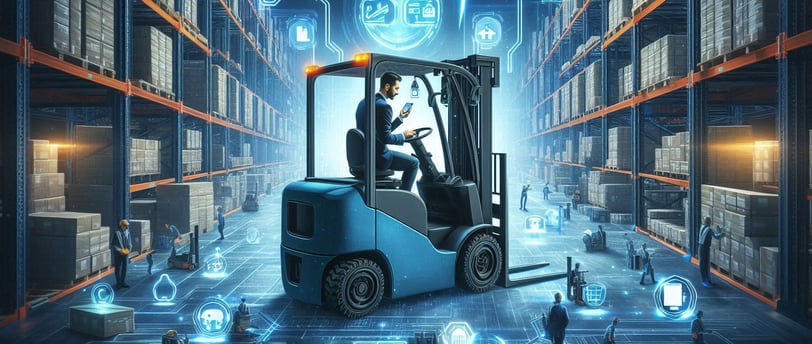The Rise of Electric Forklifts: How Sustainable Material Handling is Revolutionizing Warehouses
Discover how electric forklifts are transforming warehouses with sustainable material handling, reduced costs, and improved efficiency. Learn about the benefits, battery advancements, and future innovations in forklift technology.
INNOVATION
Anna Ryan
2/22/20253 min read


The material handling industry is undergoing a major transformation with the increasing adoption of electric forklifts. These battery-powered alternatives to traditional gas or diesel forklifts are gaining traction due to their sustainability, efficiency, and long-term cost savings. As businesses look for greener and more cost-effective solutions, electric forklifts are emerging as a game-changer in warehouse operations.
In this article, we’ll explore the benefits of electric forklifts, their impact on warehouse sustainability, advancements in battery technology, and what the future holds for this innovative material handling solution.
Why Are Electric Forklifts Gaining Popularity?
The shift towards electric forklifts is driven by several factors, including environmental regulations, cost savings, and technological advancements. Here’s why they are becoming the preferred choice in warehouses and logistics centers worldwide:
Lower Operational Costs: Electric forklifts eliminate the need for fuel, reducing overall operational expenses.
Eco-Friendly Solution: They produce zero emissions, making them an environmentally responsible choice.
Quieter Operation: Unlike internal combustion forklifts, electric models generate less noise, improving workplace conditions.
Reduced Maintenance Needs: Fewer moving parts mean lower maintenance and repair costs.
Government Incentives: Many regions offer subsidies and tax benefits for businesses transitioning to electric vehicles.
Key Benefits of Electric Forklifts
1. Sustainability and Environmental Impact
One of the most significant advantages of electric forklifts is their positive impact on the environment. Unlike diesel or LPG-powered forklifts, electric models do not emit harmful pollutants, helping companies meet stricter environmental regulations.
Key Sustainability Benefits:
Zero Carbon Emissions – Contributes to a cleaner work environment and reduces a company's carbon footprint.
Energy Efficiency – Uses electricity efficiently, lowering overall energy consumption.
Reduced Noise Pollution – Creates a quieter work environment, which is beneficial for worker health and safety.
2. Lower Total Cost of Ownership
While the initial investment for an electric forklift may be higher than a gas-powered counterpart, the total cost of ownership (TCO) is significantly lower due to:
Lower fuel costs – Electricity is cheaper than gasoline or diesel.
Reduced maintenance expenses – No engine oil changes, fewer moving parts, and longer component life.
Longer lifespan – Electric forklifts tend to have a longer operational lifespan when properly maintained.
3. Enhanced Warehouse Efficiency
Electric forklifts help improve operational efficiency in warehouse settings in several ways:
Faster Charging Times – Advancements in battery technology allow for rapid charging and opportunity charging during breaks.
Better Maneuverability – Electric models tend to be more compact and easier to operate in tight spaces.
Consistent Power Output – Unlike fuel-powered forklifts that lose power as fuel depletes, electric forklifts provide steady performance throughout operation.
Advancements in Battery Technology
The performance of electric forklifts is heavily dependent on battery technology. Recent innovations in this space have significantly improved efficiency and usability.
1. Lithium-Ion Batteries vs. Lead-Acid Batteries
Most electric forklifts today use either lead-acid or lithium-ion (Li-ion) batteries. Here’s a comparison:
FeatureLithium-Ion BatteryLead-Acid BatteryCharging Time1-2 hours6-8 hoursLifespan3,000+ cycles1,500 cyclesMaintenanceLowHigh (water refills required)Energy EfficiencyHighModerateInitial CostHigherLower
Lithium-ion batteries are quickly becoming the preferred choice due to their longer lifespan, faster charging, and minimal maintenance requirements.
2. Wireless Charging Innovations
Some manufacturers are developing wireless charging systems for electric forklifts, which would eliminate downtime due to manual charging and increase efficiency in warehouse operations.
3. Battery Swapping Solutions
For warehouses operating multiple shifts, battery-swapping technology allows for seamless transitions, reducing the need for extended charging breaks.
Challenges of Adopting Electric Forklifts
Despite the many advantages, businesses considering electric forklifts should also be aware of potential challenges:
Higher Initial Investment: The upfront cost can be higher than that of traditional forklifts.
Charging Infrastructure Requirements: Companies need to invest in appropriate charging stations.
Limited Heavy-Duty Applications: While improving, electric forklifts may not yet match the power output of large diesel models for extreme lifting tasks.
The Future of Electric Forklifts
With technological advancements and increasing environmental concerns, the future of electric forklifts looks promising. Some trends to watch include:
Artificial Intelligence (AI) and Automation: AI-powered forklifts with self-driving capabilities could revolutionize warehouse operations.
Hydrogen Fuel Cell Forklifts: Offering a cleaner and faster alternative to battery charging.
IoT-Connected Fleet Management: Smart systems that monitor forklift performance and optimize warehouse logistics.
Conclusion
The rise of electric forklifts marks a significant shift towards sustainable material handling solutions. As businesses strive for eco-friendly practices, cost efficiency, and improved warehouse operations, electric forklifts provide a viable and future-ready solution.
With advancements in battery technology, government incentives, and growing industry adoption, electric forklifts are set to become the standard in warehouse logistics. Companies that embrace this change now will benefit from lower operational costs, higher efficiency, and a reduced environmental impact.
AI ZENTRO
Stay updated with the latest AI innovations today.
AI ZENTRO © 2025. All rights reserved.
